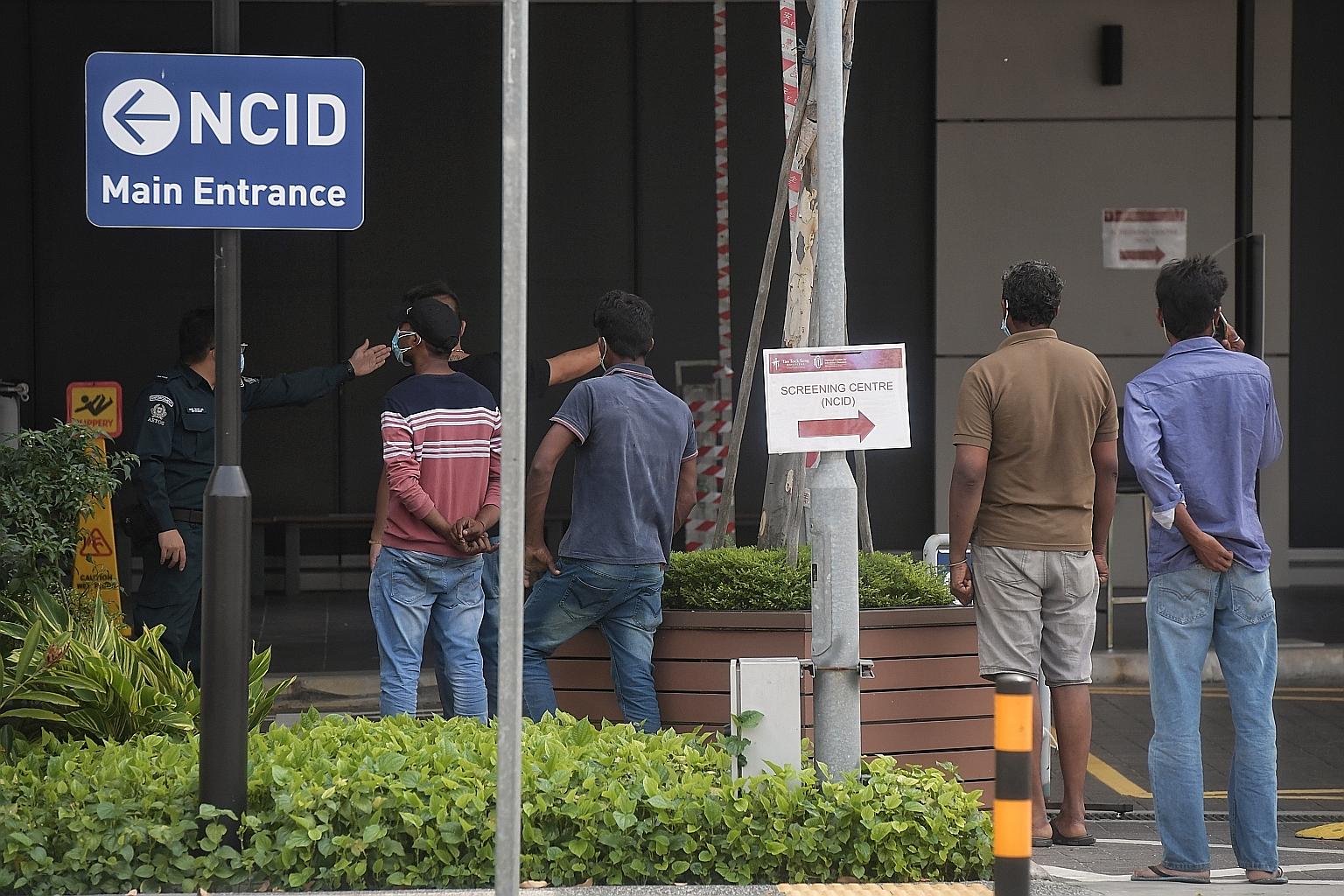Coronavirus pandemic
Coronavirus: New dorm cases to remain high as authorities focus on weak link
Sign up now: Get ST's newsletters delivered to your inbox

Foreign workers at the National Centre for Infectious Diseases last week. In densely populated communities like in the dormitories, each infected person could potentially infect as many as five to 10 others.
ST PHOTO: KUA CHEE SIONG
New daily cases of Covid-19 at foreign worker dormitories will remain high for many weeks to come, infectious diseases experts said yesterday.
But this reflects the authorities' tremendous efforts directed at this weak link rather than any lack of trying, said Professor Dale Fisher, a senior infectious diseases expert at the National University Hospital.
He said the situation is very complex and there is "a lot of catching up to do".
"It's not people turning up at the emergency department and having a swab, it's hundreds of thousands of men. We have to establish strategies on how to minimise the transmission," he added.
For example, the authorities need to decide whether to focus their efforts on dormitories that have many residents at risk, especially the 43 large purpose-built dorms, or to also spread their efforts across less-affected dorms such as smaller factory-converted dorms, of which there are "more than a thousand".
"It's cutting across efforts from the Ministry of Health, Ministry of Manpower, the army and the police force," said Prof Fisher. "If you are asking people to stay in their rooms until transmissions decrease significantly, you have got to get food to them, you have got to get Wi-Fi, you have got to get capacity for medical services at the dormitories."
And while identifying more confirmed cases is a good thing, getting them out of the dorms and into community isolation facilities is also important, he added.
But this is also challenging as such facilities are "overwhelmed at the moment" even as more are being constructed, he said.
"There are also efforts to pull out the older dorm workers and the essential dorm workers. So, as you can see, it is very complicated, but it's getting the attention it needs."
Professor Teo Yik Ying, dean of the Saw Swee Hock School of Public Health at the National University of Singapore, said each person infected with the coronavirus can generally go on to infect two or three others.
But in densely populated communities like in the dormitories, each infected person could potentially infect as many as five to 10 others.
The virus is very infectious, Prof Teo said, and if no measures were taken, the 1,000 to 2,000 cases that Singapore is reporting in dorms each day could balloon to 4,000 to 5,000 cases a day in four or five days' time.
Up to 10
The number of people who could be infected by one person in dense communities like dormitories.
The number of people who could be infected by one person in dense communities like dormitories.
10,000
The potential number of daily new cases in dorms after one or two weeks, if no measures are taken.
The potential number of daily new cases in dorms after one or two weeks, if no measures are taken.
Up to 4 weeks
The time it will take to successfully contain the outbreak in dorms, even if measures work.
The time it will take to successfully contain the outbreak in dorms, even if measures work.
He added: "And in another four or five days' time, we will be looking at 8,000 to 10,000. That is the reality that we are looking at.
"We need to drive down the infectivity of the virus."
To lower transmissions in the dormitories, Prof Fisher said workers need to be encouraged to stay in their rooms as much as possible.
If they need to leave their rooms, they should avoid touching anything and keep a 1m distance from one another when using the bathroom, he added.
Even if the measures work, it would take three to four weeks to contain the situation in dormitories successfully, according to model estimates.
Asked if it would be possible to tighten measures within dormitories while easing them for the rest of the country, Prof Fisher said there are several reasons why this should not be done.
He noted that there are separate strategies for the "two outbreaks" in dormitories and in the general community, but added that the two sides are still linked.
He said: "So much of Singapore relies on the foreign workers, so there are a lot of services that you couldn't open up anyway, simply because you don't have those men who provide the services."
And the healthcare system is also being stretched as hospitals work to care for infected workers, so "this is a bad time for more community outbreaks", said Prof Fisher.


